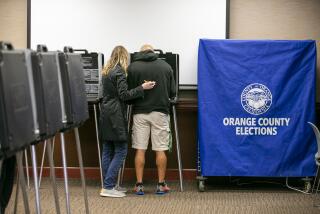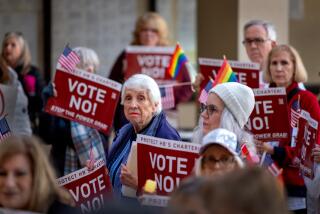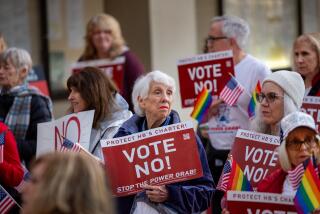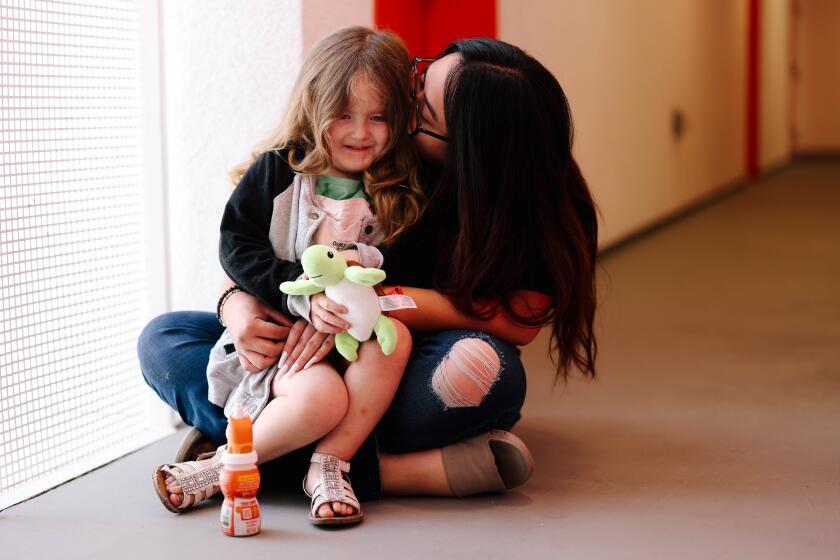In Huntington Beach, a new wave of resentment revives ‘909er’ stereotype
On a sunny September day, Christina Ayres lay on the sand near the Huntington Beach Pier, tanning in a pink bikini, and ticked off the things that identify a 909er.
Bad clothing — “ ‘Jersey Shore’ style,” the 29-year-old explained. And meth addicts. “That’s what you hear on the news.”
Over on Main Street, Ryan Kaupang, 21, had a more specific description: “White kids that dress like bros,” he said, “bros” meaning people who wear cut-off jerseys and motocross gear and “try to act like tough guys.”
For years, a stubborn divide between youth in Orange County’s beach communities and those who visit from the inland has been summed up in the term ‘909ers,’ a less-than-flattering reference to an Inland Empire area code that — in beach slang — has come to mean anybody east of the county line.
Its popularity has waxed and waned but resurfaced with a vengeance in the aftermath of the U.S. Open of Surfing in Huntington Beach in July.
When the weeklong event ended in a chaotic night of broken windows, street fights and a mess of tossed food, word that 909ers were to blame spread quickly among locals, despite the fact that only three of the 12 adults arrested were from the Inland Empire. The rest were from Orange County, San Gabriel Valley and Ventura.
By the next day, residents in Huntington Beach and neighboring beach towns pointed toward the Inland Empire as the source of the bad behavior. Someone even created a Facebook page called Go Home 909ers, warning that “Southern California Beaches are for LOCALS ONLY.” When an end-of-summer beach rave was staged this month, some worried about the 909ers it might attract. Though the event drew thousands, there were few problems.
“I hate the term ‘909ers,’ ” said Connie Boardman, the beach city’s mayor. “Like it’s some crime to be from some other part of California and come to our beach.”
Yet a stereotype based on an area code persists.
Some say ‘909er’ is used as a slur. Others say it’s just used in jest. But in Huntington Beach, there is no escaping the 909 — or the 951, the 760, or any other area codes from which the city’s 15 million tourists arrive every year. This is a city that thrives on tourism but has an increasingly tense relationship with tourists.
::
There is no agreed-upon definition of a 909er. For some, it’s just a catchall for the Inland Empire. For others, it conjures up an image of young people absorbed with dirt-bike gear and lifted trucks.
Urban Dictionary takes its own shot at the 909, describing it as “a great place to live between Los Angeles and Las Vegas if you don’t mind the meth labs, cows, and dirt people.”
For the 21-year-old grad student who created the Facebook page, the tipping point was the night of violence on Main Street, which he insisted was caused by 909ers.
“We’re trying to defend our beaches from people that don’t live there. People that come down to destroy instead of protect,” he said, declining to give his name because of the possible repercussions. “I’d prefer if they just didn’t come at all.”
Susie Smith, owner of Makin Waves Salon on Main Street, said some visitors seem to “come with a chip on their shoulder and think we have more things or a better life than they do, and they don’t respect our community.”
She conceded, though, that labeling people from the Inland Empire ‘909ers’ may not help ease the tension.
“Maybe it’s causing some rivalry,” she said. “Maybe people come from these areas with an attitude because Orange County is labeling them.”
When the 909 area code was created in 1992, it quickly gained a negative reputation. “The 909” was used on TV shows and by comedians as shorthand for a low-class community.
“There’s a very close connection between the Inland Empire and Orange County simply because geographically they border one another. So there’s that county rivalry,” said Susan Phillips, assistant professor of environmental analysis at Pitzer College, which sits firmly in the 909. In reality, she said, both regions are much more diverse than stereotypes would have us believe.
Still, many western Riverside County residents could barely contain their joy in 2004 when their area code was changed to 951.
::
Tourism is the lifeblood of Huntington Beach. In addition to the U.S. Open, where crowds get so thick it’s tough to walk on the beach, the city hosts an annual national paintball tournament that attracts tens of thousands. There are volleyball tournaments, food festivals and ample parking for the millions who come just to spend a day at the beach, under an umbrella, huddled around a bonfire or soaking up the night life on Main Street at night.
On a recent Thursday, dozens of residents in Hawaiian shirts and shorts packed a Main Street library room to talk about the city’s downtown. They cited a litany of horrors brought by visitors to what locals say is an increasingly raucous Main Street night scene: fights in the early morning hours, vomiting in the streets, urinating in the bushes.
“We love our tourists,” said Jerry Wheeler, president and CEO of the Huntington Beach Chamber of Commerce. “It’s a huge benefit to the economy here in Huntington Beach. At the same time, there are certain events that have been held here and certain situations that … there is an issue that needs to be addressed.”
Despite the frustration, many in town want the inland-focused animosity to go away.
Rick Fignetti, owner of Rockin Fig Surf on Main Street, an institution in this town, said he knows lots of people who use the term. But, he said, “I don’t hold any prejudice against anyone because of where they’re from. It’s not their fault they have to live over there in the desert.”
He said the chaos that followed the U.S. Open of Surfing was just “a bunch of spoiled rich kids causing problems.”
Near the pier, Dan Post, 43, sat on a concrete wall, taking a break from riding his bike. He said he moved to Huntington Beach from Las Vegas and was perplexed by the way locals use ‘909ers.’
“Area codes — I’m new to that,” he said. “It’s so weird in California you’re defined by the area code you’re from. It’s ridiculous.”
Sitting under a rainbow umbrella, Angelica Paz, 21, who was visiting from Ontario, said she’d never heard the term, though she she’d heard that residents of inland cities are often looked down on in other parts of Southern California.
“I get that people come here and trash the beach, but it’s not just people from the Inland Empire,” she said.
Alan Robles, 20, who lives in Moreno Valley, said the stereotype reflects class differences between Orange County and inland cities.
“You come here, and it’s a more luxurious community,” he said. “It’s easy to put the blame on someone who is from a less financially stable community if they don’t want to put the blame on themselves.”
From 60 miles away, east on the 91 Freeway and north on the 215, San Bernardino County Supervisor Janice Rutherford said stereotypes persist for a reason.
“It’s always easier to blame others than to look at problems in your own community,” she said.
The Inland Empire is “an area of hardworking family people trying to build great communities,” she said. “When it comes right down to it, we’re not that different from people who are doing the same thing but just happen to have a view of the ocean.”
More to Read
Start your day right
Sign up for Essential California for news, features and recommendations from the L.A. Times and beyond in your inbox six days a week.
You may occasionally receive promotional content from the Los Angeles Times.







